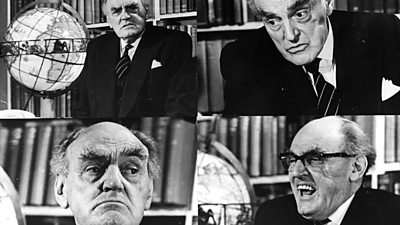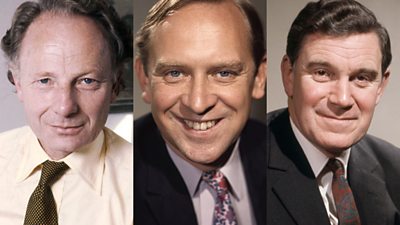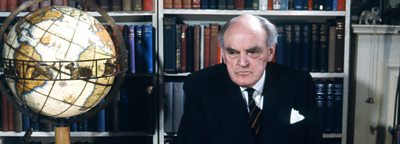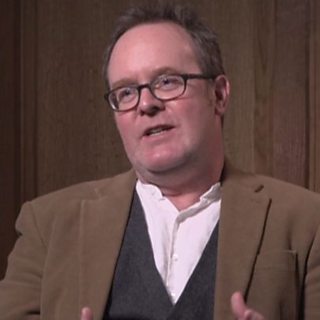In 1967, along with the arrival of pop a wider cultural revolution was unfolding. Everywhere, it seemed, informality was ‘in’ and authority was ‘out’. The notion of an agreed canon of great art or literature or ideas looked old hat.
But where did this new democratic spirit leave the ����ý, an institution which had been founded in the 1920s on the very principle, espoused by John Reith, of bringing us ‘the best’ of culture or thought – and broadcasting programmes that it judged we needed rather than programmes we wanted?

Even on the eve of Radio 1's launch, Reith's spirit still clung to the corridors, production offices and studios of the ����ý. It was perfectly possible to wander around and imagine that little had changed since before the war. Or in radio, at least. For TV felt different - it was where all the excitement and novelty now lay.
As a young Libby Purves commented, it was as if “the adventurers, the innovators, the challengers of the establishment” had abandoned Broadcasting House for Television Centre and Lime Grove, leaving behind only the aged, the nostalgic, and the timid.
It was in 1966 that John Simpson, just 22 years old, arrived in the radio newsroom for his first shift. He looked around and saw “a preponderance of grey hair and cardigans” - “older versions of myself: tweedy, brief-cased, polite, earnest, conscientious, middle-class, slightly arty, nonconformist, yet distinctly conformist as well.”
Another new arrival that year – though not to the newsroom - was the young presenter Terry Wogan, who’d previously worked at the Irish broadcaster RTE. In this newly-released interview from the ����ý’s archive, he describes his own first impressions of Broadcasting House:
The ����ý of the mid-1960s, then, was arrogant. But with that arrogance, Wogan suggests, came something rather useful: self-confidence. It created a working culture where staff could pursue what they believed in, where time and effort could be devoted to shaping a tentative, half-formed programme idea into something fully realized, a culture where programme-makers were committed to leading taste, not just following it.
For Wogan, the key to the Reithian ideal was an acceptance of unpredictability – that in making radio “you cannot tell what’s going to work until you actually do it”.
The ‘gold standard’ for this tolerance for trial-and-error had been set in 1946, with the launch of the Third Programme. The ����ý’s director-general at the time, William Haley, declared that the new service would have no fixed points such as news bulletins, that it would devote to each subject or performance the time it deserved – no more, no less.
What did this mean in practice? The man in charge of the Third Programme as it was evolving into Radio 3, was Howard Newby. In his interview for the ����ý Oral History collection, Newby describes how the Third traditionally operated on the principle that programme content was never simply there to ‘fill’ a regular slot in a pre-arranged schedule:
In describing how the Third allowed historians to bump up against physicists on the airwaves, Newby draws attention in his interview to another dimension of ‘traditional’ Reithian thinking: that by providing a mixed schedule, a kind of intellectual cross-fertilization might take place –something that might, over time, widen the listeners’ horizons.
The problem, though, as Newby recognized, was one of tone. If it was to have anything other than the tiniest of audiences, the difficult ideas and unfamiliar music in which the Third specialized needed, surely, to be introduced on air in ways that were never too excluding:
The tape-recorder was used more and more in the 1960s. And it liberated many grateful programme-makers from the tyranny of the polished, over-rehearsed script. Presenters and interviewees alike were able to speak more spontaneously, knowing that any major blunders could be edited out later. Speech – and presentational styles - loosened-up.
Microphone technique was just one dimension of something larger, though: Newby’s nagging worry about the appeal of a network to its listeners – and, even more, to its potential listeners. This was typical of those in overall charge of the ����ý’s radio networks in the 1960s.
Programme-makers and production departments, such as Drama or Music, naturally cared most for their own individual programmes, for the chance to express their own passions. Network Controllers, on the other hand, had to think more about ratings, about achieving some sense of consistency in tone and character for their channel. It made them more sensitive to the tastes of their audience, more attracted to the security of a predictable schedule.
There’d always been some level of predictability, of course. The Light Programme had generally offered us entertainment, the Home Service information and talk, the Third music. But none had been entirely consistent. They’d overlapped. They’d offered listeners a few surprises.
The arrival of Radio 1 in 1967 appeared to signal a decisive step towards radio that really would be more ‘streamed’ or ‘generic’: each network supposedly offering fairly predictable and familiar output, fixed points such as news bulletins, a particular rhythm and tone. It looked like the kind of radio that would answer a Controllers’ wildest dreams and the programme-makers’ worst nightmares.
But, when it came to predictions about the death of Reithian ideals, was this new streamed approach to radio less a cause and more a symptom of deeper trends?

Another newly-released interview from the ����ý’s archives reveals other factors already at work inside Broadcasting House – and, in particular, a wholesale changing of the guard among those in charge of the networks. At Radio 3, for instance, Newby was soon replaced by Stephen Hearst; at Radio 4, Gerard Mansell was replaced by Tony Whitby. The new overall Managing Director of Radio was to be Ian Trethowan. Suddenly all the new men – and it was men – were from Television.
Philip French, best known as the Observer newspaper’s long-serving film-critic, worked for many years as a radio producer. Since joining the ����ý in 1961, his most significant role had been producing arts discussion programmes, such as Critics’ Forum and The Critics.
For most of the time French enjoyed a free hand in what went into these series. But at the end of the 1960s – as the new management figures settled into their new roles - he sensed a change: a “great hostility to criticism”. They “didn’t like critics”, he said, “and they didn’t want a programme with the word critics in it”.
It was, he thought, all part of a more macho culture which the television men brought with them:
Yet it’s possible to see, too, some good Reithian principles at work, even in the new, streamlined radio networks of the early-1970s.
It comes down to seeing the schedule – and not just an individual programme – as a true piece of creative work in the service of the public.
Take, for instance, this interview with Gerard Mansell, who’d come from the Overseas Service in 1965 to take charge of the Home Service and Music Programme. Mansell gives a fascinating insight into the role of the Network Controller in dealing with figures such as William Glock, who was then in charge of the Music Division. It was, Mansell suggests, one of mediating between the interests of the music professionals – represented by Glock and his producers – and what he calls the ‘music loving public’:
Mansell’s fascinating insight into the role of the network controllers reminds us that broadcasting was never simply about creative programme-makers struggling against faceless bureaucrats. Managers had just as much of an investment in the success of the output as their producers. But, of necessity, they had a close interest in the tastes and prejudices of their audience, which made them figures of suspicion to many who worked for them.
In the years either side of 1967, then, we get a keen sense from the oral history archives of a medium delicately balanced. We find radio poised between old and new, elitism and populism, eclecticism and conformism.
Like the Corporation at large, ����ý Radio didn’t yet think with one mind, or speak with one voice. Disagreement, debate, compromise: it was all hard-wired into the system. And that, in itself, could only be described as… well, Reithian.

